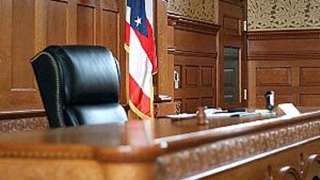
A three-judge panel has agreed with New Jersey's Supreme Court that a judge who suggested a woman should "close her legs" to prevent a sexual assault should be removed from the bench.
The panel's recommendation released Tuesday echoes what the court decided last summer in the case of state Superior Court Judge John Russo Jr., who has been on unpaid suspension during his appeal. He will have a chance to file a response to the panel's recommendation and have a hearing in late March.
In court filings and at a hearing in December, Russo expressed remorse for his comments to the woman and for joking about the exchange with court personnel afterward. He also has argued that the Supreme Court's penalty is excessive because an advisory panel on judicial conduct had recommended a three-month unpaid suspension last year.
The woman appeared before Russo in 2016 seeking a restraining order against a man she said sexually assaulted her. According to a transcript of the exchange, when the woman described her encounter with the man, Russo asked her, "Do you know how to stop somebody from having intercourse with you?"
When the woman answered affirmatively and said one method would be to run away, Russo continued, "Close your legs? Call the police? Did you do any of those things?"
He also made joking comments to staffers about the exchange after the woman had left the courtroom, according to a report issued by the judicial conduct committee.
Russo has contended he was only trying to elicit more information from the woman and that he chose his words poorly, and that he has acknowledged his mistake.
News
Tuesday's report noted that the four instances of Russo's alleged misconduct - including a matrimonial matter where he failed to recuse himself even though he knew one of the parties involved - didn't indicate dishonesty when taken separately, but that his testimony regarding two of the allegations "lacked candor, fabricated after-the-fact explanations for events, and displayed a lack of integrity that is unworthy of judicial office."
"Because respondent committed multiple acts of severe misconduct and offered less than truthful testimony before both the ACJC and the panel in an effort to deny or minimize his actions, thereby demonstrating his unfitness for judicial office, the record coupled with the relevant case law supports imposition of the most severe sanction: removal from judicial office," the panel wrote.



